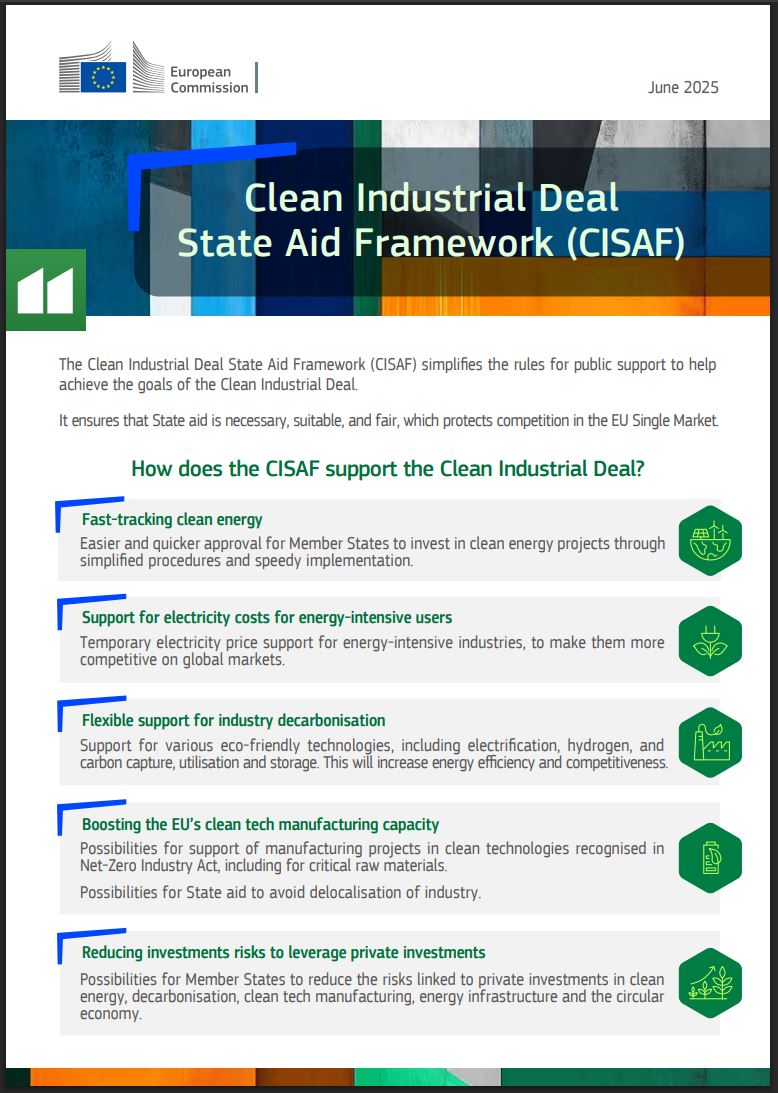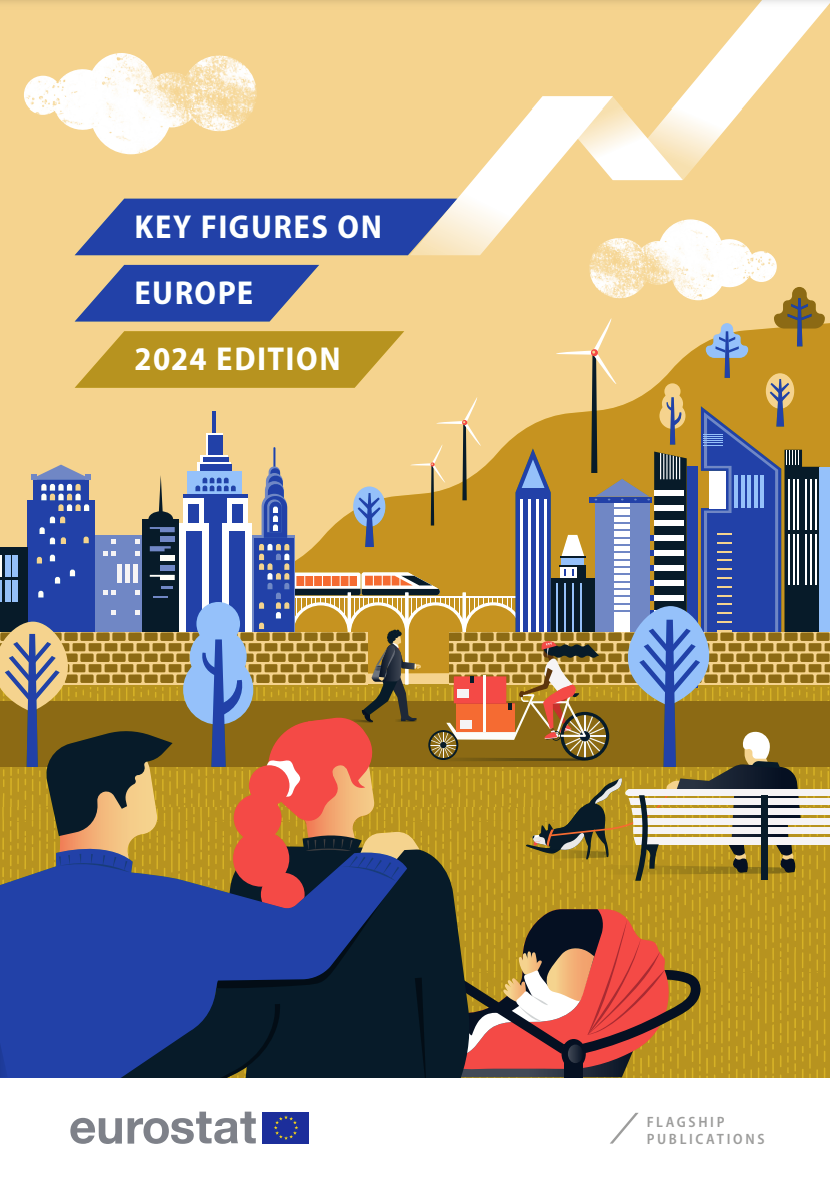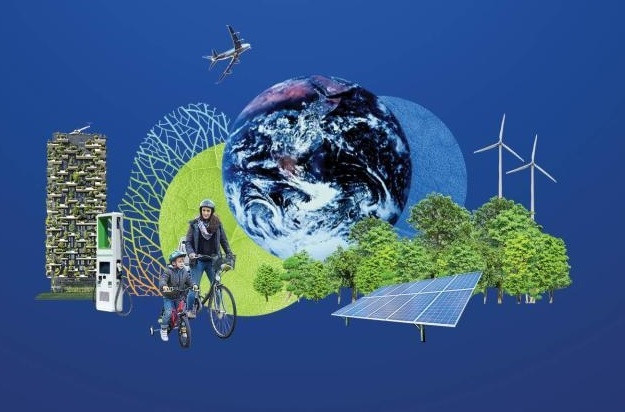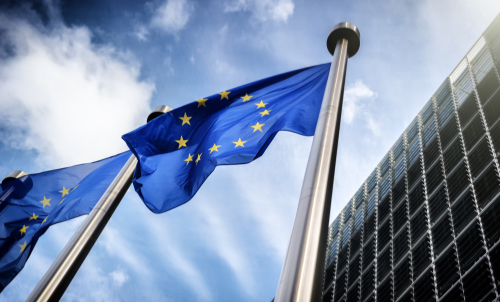Energy
transition
Energy transition is a transition from an energy system based primarily on fossil fuels to a system based on renewable energy sources (RES).

Replacing coal and oil with cleaner alternatives contributes to a significant reduction in greenhouse gas (GHG) emissions in economic sectors, closely linked in particular to electricity consumption. This substitution clearly contributes to the energy transition we are witnessing in Europe and elsewhere – it is a transition from an energy system based mainly on fossil fuels to a system based on renewable energy sources (RES). In other words: we are witnessing an energy transition to a low-carbon society.
LATEST

New State aid framework enables support for clean industry
The European Commission adopted in June 2025 a new State aid framework supporting the Clean Industrial Deal (CISAF), to enable Member States to push forward the development of clean energy, industrial decarbonisation and clean technology.
The CISAF sets out the conditions under which Member States can grant support for certain investments and objectives in line with EU State aid rules. Under the Framework, the Commission will authorise aid schemes introduced by Member States to boost clean industry, enabling the swift roll-out of individual aid.
The CISAF will be in place until 31 December 2030.
Press release / Overview of Support Measures / Clean Industrial Deal State Aid Framework (CISAF)

Key energy figures on Europe – 2024 edition
Did you know that the share of renewables in EU energy consumption rose from 16% in 2012 to 23% in 2022?
You can find this information and much more in the 2024 update of Key figures on Europe!

REPowerEU: Joint European action for more affordable, secure and sustainable energy
The European Commission proposed on 8 March 2022 an outline of a plan to make Europe independent from Russian fossil fuels well before 2030, starting with gas, in light of Russia’s invasion of Ukraine.

Energy prices: Commission presents a toolbox of measures to tackle exceptional situation and its impacts
The European Commission adopted on 13 October 2021 a Communication on Energy Prices, to tackle the exceptional rise in global energy prices.

European Commission unveils Fit for 55 legislative package
The European Commission unveiled on 14 July 2021 the ‘Fit for 55’ package of climate and energy laws. The Slovenian Presidency welcomed the unveiled project, which is also a priority of the Presidency in the field of the environment and climate change.

Slovenia adopted the Resolution on Long-Term Climate Strategy until 2050
The National Assembly of the Republic of Slovenia adopted on 13 July 2021 the Resolution on Long-Term Climate Strategy until 2050. A clear goal of Slovenia’s climate strategy is to transition to net-zero emissions and become climate neutral by 2050.

European Green Deal: new EU energy policy contributions towards building a climate neutral Europe
The European Commission has on 14 October 2020 adopted a series of energy policy proposals and reports, which are fundamental to the implementation of the European Green Deal, and to achieving climate neutrality by 2050 and the ambitious emission reduction targets for 2030. The Commision adopted a Communication on an EU Renovation Wave, aiming to double the renovation rate of buildings in Europe and make them fit for a climate neutral future. The College also adopted a Strategy to Reduce Methane Emissions, which are the second biggest contributor to climate change after carbon dioxide. The Commission has also adopted and published the State of the Energy Union Report and accompanying documents including individual assessments of the 27 National Energy and Climate Plans. These detailed reports assess the Energy Union’s contribution to the European Green Deal, and the opportunities for the energy sector from the green transition.
KEY DOCUMENTS

WORLD:
Paris Agreement: https://eur-lex.europa.eu/legal-content/EN/TXT/HTML/?uri=CELEX:22016A1019(01)&from=SL

EU:
Climate change: what the EU is doing: https://www.consilium.europa.eu/en/policies/climate-change/
National long-term strategies: https://ec.europa.eu/info/energy-climate-change-environment/implementation-eu-countries/energy-and-climate-governance-and-reporting/national-long-term-strategies_en
Energy Union: https://www.consilium.europa.eu/en/policies/energy-union/
European Green Deal: https://www.consilium.europa.eu/sl/meetings/european-council/2019/12/12-13/
Energy transition in cities: https://commission.europa.eu/eu-regional-and-urban-development/topics/cities-and-urban-development/priority-themes-eu-cities/energy-transition-cities_en
REPowerEU: Joint European action for more affordable, secure and sustainable energy

SLOVENIA:
National Energy and Climate Plan: https://www.energetika-portal.si/fileadmin/dokumenti/publikacije/nepn/dokumenti/nepn_5.0_final_feb-2020.pdf
National Resolution on Long-Term Climate Strategy until 2050 (July 2021): https://imss.dz-rs.si/IMiS/ImisAdmin.nsf/ImisnetAgent?OpenAgent&2&DZ-MSS-01/e2c0b7e31be9ae56d6266a9318ca072a83c4483facd767f195a0c3fc5e9f723d
National Strategy to Phase Out Coal and Restructure of two coal intensive regions – Zasavje and Savinjsko-šaleška region (December 2021): https://www.energetika-portal.si/fileadmin/dokumenti/publikacije/premog_izhod/strategija_prem_vlada_jan202.pdf
***
Report on the situation in the energy sector in Slovenia in 2022 (October 2023)
The Slovenian Energy Agency has published a Report on the energy situation in Slovenia for 2022. The report presents in detail the situation and development of electricity and natural gas markets, achieving the goals of electricity production from RES and CHP, consumer protection, end-use energy savings and heat supply.
